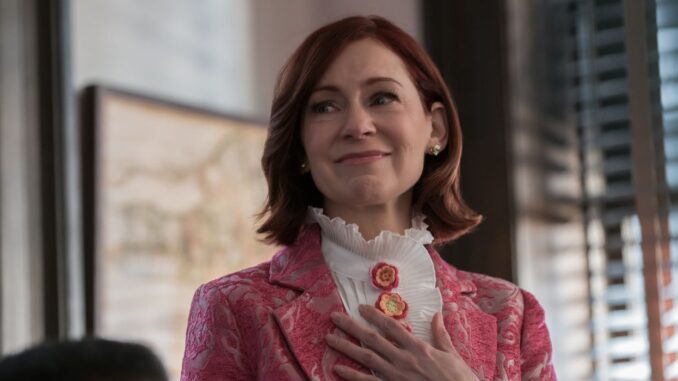
When Quirks Become Clues: Carrie Preston’s Elsbeth Shines in a World Obsessed with Perfection
Carrie Preston’s Elsbeth Tascioni is a refreshing gust of eccentric wind blowing through the meticulously constructed world of procedural television. In “Elsbeth,” the spinoff of “The Good Wife” and “The Good Fight,” Preston reprises her role as the relentlessly optimistic, seemingly scatterbrained lawyer turned police observer. Yet, what on the surface appears to be a collection of endearing quirks – her perpetually optimistic outlook, her stream-of-consciousness observations, her penchant for childlike wonder – is, in fact, a potent crime-solving arsenal. “Elsbeth” thrives on the premise that difference, rather than being a hindrance, can be a superpower, a unique lens through which to dissect the machinations of criminal minds.
Elsbeth’s brilliance lies in her ability to see what others miss, to perceive the incongruities that are obscured by societal expectations and ingrained assumptions. While her colleagues, particularly the stoic and by-the-book Captain Wagner, initially dismiss her as an oddity, her seemingly random observations often prove to be the key to unlocking the puzzle. She notices the misplaced flower arrangement in a victim’s apartment, the subtle flicker of unease in a witness’s eyes, the unusual scent lingering in a crime scene. These details, dismissed as insignificant by those focused on the obvious, become crucial threads in Elsbeth’s intricate web of deduction.
This unconventional approach stems from her unique perspective. Elsbeth doesn’t adhere to the rigid rules of engagement that confine many detectives. She’s not bound by procedure, nor is she intimidated by social hierarchies. This freedom allows her to approach each case with a fresh perspective, unburdened by preconceived notions. Her seemingly rambling conversations, often peppered with tangents and personal anecdotes, are actually a carefully constructed method of drawing out information. She lulls suspects into a false sense of security, making them believe she’s simply a harmless eccentric, only to subtly maneuver them into revealing crucial details.
The show cleverly subverts the typical crime drama trope of the brilliant but troubled detective. Elsbeth isn’t battling inner demons or grappling with a dark past. Her past, hinted at through her relationships and her legal background, is less about trauma and more about a lifelong commitment to justice, informed by a deep empathy for others. This makes her all the more relatable and appealing. She’s not superhuman; she’s simply human, embracing her quirks and using them to her advantage.
The dynamic between Elsbeth and her partners, especially Kaya Blanke, further highlights the power of embracing difference. Kaya, a driven and ambitious police officer, initially views Elsbeth with skepticism. However, as they work together, she begins to appreciate Elsbeth’s unique perspective and the value of her unconventional methods. Kaya’s meticulous attention to detail and her understanding of police procedure complement Elsbeth’s intuitive leaps of logic, creating a powerful synergy. This partnership underscores the show’s central message: that embracing diversity in thinking and approach leads to more effective problem-solving.
Furthermore, “Elsbeth” challenges the societal pressure to conform, particularly in demanding professional environments. Elsbeth refuses to apologize for her idiosyncrasies. She embraces them, using them as tools to navigate the complex world of law enforcement. In a society that often rewards conformity and penalizes deviation, Elsbeth’s unwavering self-acceptance is both inspiring and empowering. She demonstrates that true strength lies not in erasing our differences, but in harnessing them to achieve our goals.
In conclusion, “Elsbeth” is more than just a crime procedural; it’s a celebration of individuality and a testament to the power of embracing difference. Carrie Preston’s portrayal of Elsbeth Tascioni is a masterclass in nuanced performance, bringing to life a character who challenges our assumptions about brilliance and success. By showcasing how Elsbeth’s perceived quirks become invaluable crime-solving tools, the show encourages us to re-evaluate our own preconceived notions about what it means to be effective, and to appreciate the unique contributions that each individual, with all their quirks and eccentricities, can bring to the table. Ultimately, “Elsbeth” reminds us that true power lies not in conformity, but in the unwavering embrace of our authentic selves.
